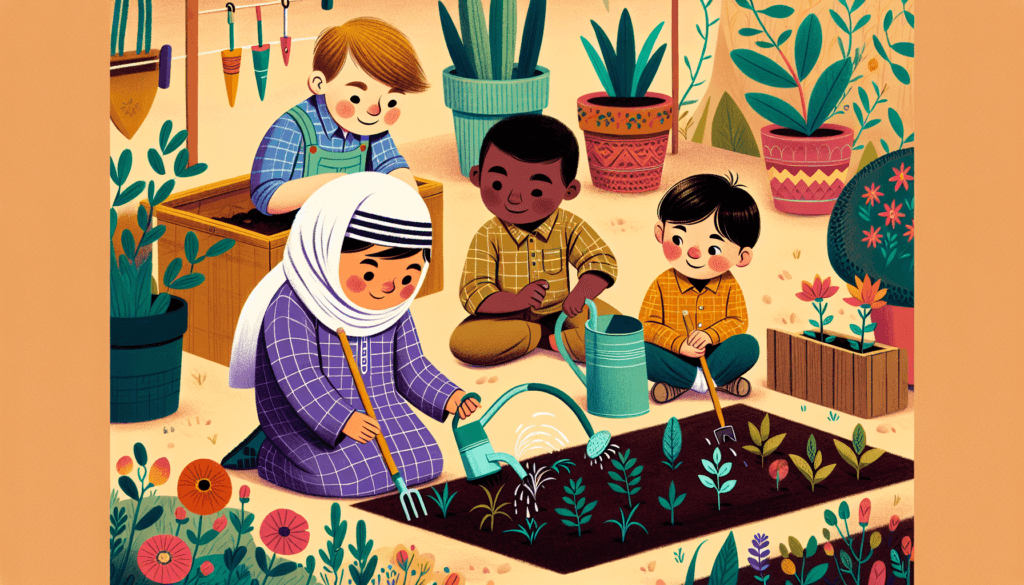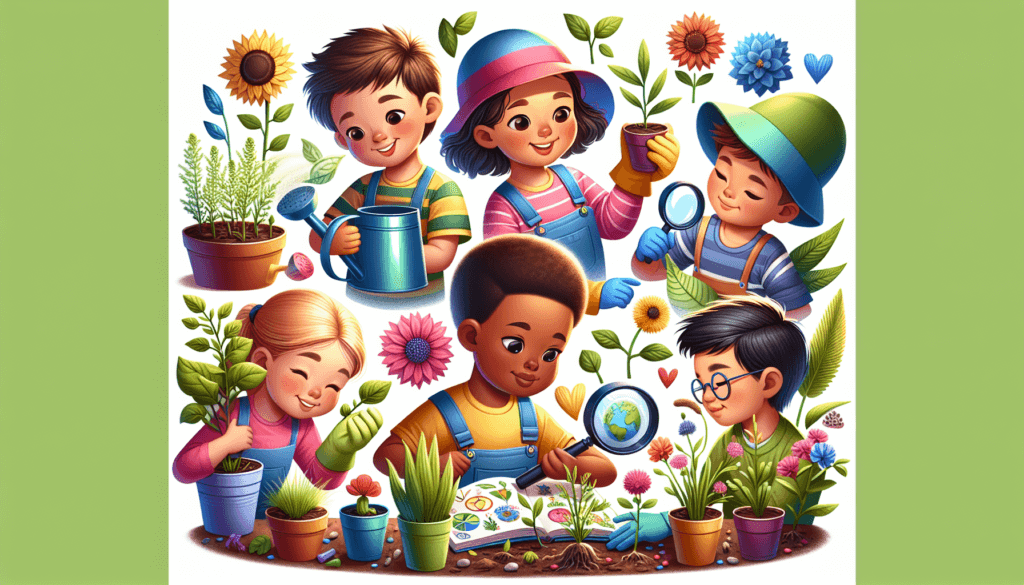Imagine a world where your child not only learns, but also grows, both physically and mentally. Picture your little one eagerly getting their hands dirty, planting seeds, tending to plants, and watching as their very own garden blooms before their eyes. Gardening may seem like a simple activity, but it holds incredible potential in enhancing your child’s development in ways you may not have thought possible. From building a connection with nature to fostering a sense of responsibility and patience, this article explores the numerous benefits that gardening can offer your child’s overall growth and development.
Physical Development
Fine Motor Skills
Gardening activities require children to use their hands and fingers to manipulate tools, seeds, and plants. This helps in developing their fine motor skills and hand-eye coordination. As they carefully sow seeds or transplant seedlings, children learn to control their movements and improve their manual dexterity. Furthermore, the delicate tasks of pruning and picking flowers or vegetables also help in refining their small muscle movements.
Gross Motor Skills
In addition to fine motor skills, gardening also promotes the development of gross motor skills. Tasks like digging, raking, and carrying heavy watering cans or bags of soil involve larger muscle groups, which helps children build strength and endurance. By engaging in these physical activities, children enhance their coordination, balance, and body awareness. The diverse movements required in gardening contribute to their overall physical development and provide opportunities for enjoyable exercise.
Health Benefits
Gardening provides numerous health benefits for children. Spending time outdoors, exposed to sunlight, fresh air, and nature, encourages physical activity and reduces sedentary behavior. Being physically active while gardening helps promote cardiovascular health and muscle development. Exposure to sunlight also aids in the production of Vitamin D, which is essential for bone health. Additionally, gardening fosters a connection with the natural environment, promoting a sense of well-being and reducing stress levels.
Cognitive Development
Problem-Solving Skills
Gardening presents children with various challenges that require problem-solving skills. They learn to identify and address issues like pests, diseases, and nutrient deficiencies affecting plants. Through observation and research, they develop critical thinking and deductive reasoning abilities to find creative solutions. Cultivating problem-solving skills in the garden nurtures their ability to think analytically and make informed decisions, skills that transfer to other aspects of their lives.
Critical Thinking
Analyzing different aspects of gardening, such as proper plant care, soil conditions, and weather patterns, encourages critical thinking in children. They need to assess various factors and make informed choices to ensure successful plant growth. Critical thinking also comes into play when they experiment with different planting techniques or try out innovative ways to address gardening challenges. Gardening fosters a sense of curiosity and the ability to think critically and independently.
Mathematical Skills
Gardening provides a practical context for children to develop their mathematical skills. From measuring the appropriate depth for planting seeds to calculating the spacing between plants, they engage in mathematical thinking. They also learn about fractions and ratios when mixing soil amendments or diluting fertilizers. Garden-related activities offer opportunities to reinforce concepts such as counting, addition, subtraction, and estimation. These mathematical skills foster a solid foundation for future academic success.
Scientific Knowledge
Gardening promotes scientific inquiry and encourages children to explore the natural world. They observe and record changes in plants, assess their growth rates, and investigate the effects of different environmental factors. By experimenting with variables like sunlight exposure or varying soil compositions, children gain firsthand experience in scientific methods. Gardening also introduces them to botany, biology, and ecology, helping them develop a deeper understanding of how living things interact and thrive.

Emotional Development
Responsibility and Empathy
Gardening instills a sense of responsibility in children as they take on the role of nurturing living organisms. They learn that plants depend on them for their care, requiring regular watering, weeding, and protection from pests. This responsibility fosters empathy as children develop an understanding of the needs and vulnerabilities of living things. Through gardening, they cultivate a sense of connection and empathy towards nature, which can extend to their interactions with people and animals.
Stress Reduction
Gardening provides a calming and therapeutic experience for children, helping reduce stress and anxiety. Being in nature, engaging in physical activity, and focusing on the nurturing process can be soothing and meditative. The simple act of tending to plants, connecting with the earth, and observing the growth and transformation of their garden can have a profound effect on a child’s emotional well-being. Gardening offers a peaceful sanctuary where children can find solace and tranquility.
Confidence Building
As children witness the fruits of their labor in the form of flourishing plants, their confidence and self-esteem naturally grow. They develop a sense of accomplishment knowing that they played a vital role in nurturing life. Gardening provides a tangible and visible outcome of their efforts, boosting their belief in their abilities. Additionally, when children overcome obstacles and challenges in their garden, they gain confidence in their problem-solving skills, resilience, and adaptability.
Social Development
Teamwork
Gardening offers opportunities for collaboration and teamwork, allowing children to work together towards a common goal. Whether it’s preparing the soil, planting seeds, or maintaining the garden, children learn to share responsibilities, communicate effectively, and cooperate with others. Working in teams fosters a sense of unity and teaches them the value of collective effort. Collaboration in the garden strengthens their social skills and builds a foundation for successful collaboration in other group settings.
Communication Skills
Engaging in gardening activities encourages children to express their thoughts, observations, and ideas. They learn to verbalize their experiences, ask questions, and seek guidance from others. Interacting with plants and living creatures also cultivates a sense of empathy and respect that can extend to their relationships with peers and adults. Communicating their gardening experiences allows children to develop their vocabulary, clarity of expression, and active listening skills.
Respect for Nature and Living Things
Through gardening, children develop a deep respect for nature and a connection to the environment. They learn to appreciate the interconnectedness of all living things and the importance of ecological balance. Gardening teaches them to handle plants and living creatures with care and respect their natural growth processes. This respect for nature extends to a broader appreciation for the environment, fostering a sense of responsibility towards sustainability and biodiversity preservation.

Sensory Development
Outdoor Sensory Experience
Gardening provides a rich sensory experience for children as they engage with nature using all their senses. They can touch and feel different textures of plants, soil, and insects, stimulating their tactile senses. The fragrance of flowers and herbs adds an olfactory dimension to their exploration. The sounds of chirping birds and buzzing bees create an auditory connection to nature. Outdoor sensory experiences in the garden contribute to the development of a child’s sensory awareness and perception.
Tactile Stimulation
Gardening involves various tactile experiences that promote sensory development. Children can feel the different consistencies of soil and distinguish between dry, moist, or compacted earth. By handling seeds, seedlings, and flowers, they develop a sense of touch and fine-tune their tactile discrimination skills. Activities like digging, weeding, and pruning also provide sensory input, helping children become more aware of their bodies and develop their sense of touch.
Language Development
Vocabulary Enhancement
Gardening exposes children to a wide range of vocabulary related to plants, gardening tools, and natural processes. They learn the names of different plants and parts of a plant, botanical terms, and various gardening techniques. Engaging in conversations with peers and adults about their observations and experiences in the garden expands their vocabulary. The acquisition of new words and terminology enhances their language skills and fosters effective communication.
Narrative Skills
Gardening provides opportunities for children to develop their narrative skills. They can describe their gardening experiences, recount their discoveries, and share stories of their gardening adventures. Engaging in storytelling helps children organize their thoughts, structure their narratives, and develop their storytelling abilities. By verbalizing their gardening experiences, they enhance their narrative skills and cultivate a love for storytelling and self-expression.

Environmental Awareness
Understanding Ecosystems
Gardening introduces children to the intricate web of life and fosters an understanding of ecosystems. They learn about the interconnected relationships between plants, insects, birds, and other organisms in their garden. Children begin to comprehend the importance of biodiversity, pollination, and the role of decomposers. As they observe firsthand the effects of pollution or inadequate care on their plants, they develop an awareness of human impact on ecosystems and the importance of environmental stewardship.
Appreciating Nature
Gardening helps children develop a deep appreciation for the beauty and wonder of the natural world. By immersing themselves in the garden, they witness the seasons change, observe the growth and transformation of plants, and experience the resilience of nature. Through gardening, children learn to value the delicate balance of ecosystems, the importance of conserving natural resources, and the need to protect the environment for future generations. Gardening cultivates a lifelong appreciation and love for nature.
Nutritional Education
Growing and Consuming Healthy Food
Gardening allows children to actively participate in the process of growing their own food, encouraging a nutritious and balanced diet. They learn about different types of fruits, vegetables, and herbs, gaining knowledge about their nutritional value and health benefits. Children become more invested in trying and enjoying fresh produce when they have played a role in nurturing and harvesting it. Gardening provides practical insights into the journey of food from the soil to the table.
Awareness of Farm-to-Table Concept
Gardening fosters an understanding of the farm-to-table concept, teaching children about the origin of their food. They learn about the importance of sustainable agriculture, reducing food miles, and making environmentally friendly food choices. Through gardening, children gain an appreciation for the effort and resources required to produce food, fostering a sense of gratitude and responsibility towards the food they consume. Understanding the farm-to-table concept helps children become conscious consumers and advocates for sustainable practices.

Creativity and Imagination
Artistic Expression
Gardening offers opportunities for children to express their creativity through artistic endeavors. They can design their garden layout, create colorful plant labels, or paint garden-themed artworks. Gardening also allows them to experiment with different combinations of plants, colors, and textures, resulting in visually appealing displays. Engaging in aesthetic activities in the garden nurtures their artistic expression, fostering a sense of creativity and imagination.
Fantasy and Make-Believe Play
The garden can become a magical realm where children can indulge in fantasy and make-believe play. They can imagine themselves as fairies, gardeners, or nature explorers, crafting elaborate stories and adventures. The diverse elements of the garden, such as flowers, insects, and secret hiding spots, provide endless inspiration for imaginative play. Gardening sparks their imagination and encourages children to create their own narratives, enhancing their storytelling abilities and imaginative thinking.
Life Skills
Patience and Perseverance
Gardening teaches children the value of patience and perseverance. They learn that plants take time to grow and require consistent care. Waiting for seeds to sprout or flowers to bloom instills a sense of patience as children understand the importance of attentive nurturing. Gardening also provides opportunities for children to persevere through challenges like pest control or weather-related setbacks. These experiences cultivate resilience and a growth mindset necessary for overcoming obstacles in other areas of life.
Goal Setting and Achievement
Setting goals and working towards them is an essential life skill that gardening helps develop in children. Whether it’s aiming for a specific plant yield or successfully maintaining a specific garden area, children can learn the process of goal setting in their garden. As they carefully plan and execute their gardening tasks, they experience the satisfaction of achieving set objectives. These experiences in gardening empower children to transfer goal-setting skills to other areas of their lives, fostering a sense of accomplishment and self-motivation.
Gardening offers an array of positive benefits for a child’s holistic development. From physical and cognitive growth to emotional and social well-being, each aspect of a child’s development is nurtured through the exposure to gardening. By engaging in gardening activities, children develop valuable life skills, gain a deeper understanding of the natural world, and cultivate a sense of responsibility and empathy for living things. The journey of sowing seeds, caring for plants, and witnessing the miraculous process of growth instills a lifelong love for nature and environmental stewardship. So grab your shovel, put on your gardening gloves, and embark on an enriching adventure with your child in the wonderful world of gardening!



